 Petzlover
Petzlover Carpatin is originated from Romania but Welsh Terrier is originated from United Kingdom. Carpatin may grow 34 cm / 14 inches higher than Welsh Terrier. Carpatin may weigh 70 kg / 155 pounds more than Welsh Terrier. Both Carpatin and Welsh Terrier has same life span. Both Carpatin and Welsh Terrier has almost same litter size. Carpatin requires Low Maintenance. But Welsh Terrier requires Moderate Maintenance
Carpatin is originated from Romania but Welsh Terrier is originated from United Kingdom. Carpatin may grow 34 cm / 14 inches higher than Welsh Terrier. Carpatin may weigh 70 kg / 155 pounds more than Welsh Terrier. Both Carpatin and Welsh Terrier has same life span. Both Carpatin and Welsh Terrier has almost same litter size. Carpatin requires Low Maintenance. But Welsh Terrier requires Moderate Maintenance
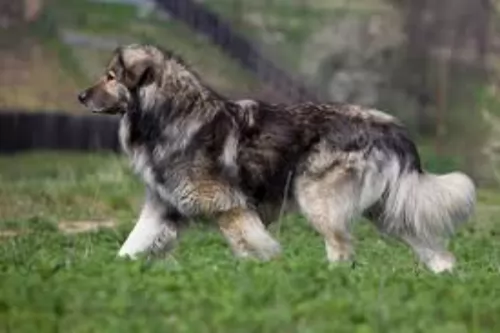 The Carpatin, known also as the Carpathian Shepherd Dog or Romanian Shepherd, is a large breed dog known for his guarding- and watch-dog abilities. Information about these dogs dates back to the 1800s, and much later, in March 1998, fans of the dog founded the Carpathian Shepherd Dogs Club.
The Carpatin, known also as the Carpathian Shepherd Dog or Romanian Shepherd, is a large breed dog known for his guarding- and watch-dog abilities. Information about these dogs dates back to the 1800s, and much later, in March 1998, fans of the dog founded the Carpathian Shepherd Dogs Club.
It is believed that the different Carpathian Shepherd Dog breeds are descendants from dogs that were developed thousands of years ago in Mesopotamia. Documentation of the origins of the dog are rare but it is thought that they are probable descendants of Lupomolossoids. However in 2005, it was finally recognized by the Federation Cynologique Internationale, and in 2006, it was recognized by the United Kennel Club. However, it is still a rare breed outside Romania.
 Originating in Wales and bred to hunt the Welsh Terrier might be the oldest dog breed from the U.K. still in existence today. They were bred to hunt badgers, rodents, and fox. Today however they are mostly bred for show and companionship.
Originating in Wales and bred to hunt the Welsh Terrier might be the oldest dog breed from the U.K. still in existence today. They were bred to hunt badgers, rodents, and fox. Today however they are mostly bred for show and companionship.
There are only two breeds of terrier that are native to the country of Wales, the Welsh and the Black and Tan Rough Terrier. It is believed that the Welsh Terrier was descended from that Black and Tan Rough Terrier in the 18th and 19th centuries. The Welsh Terrier was separated out as a separate breed in the late 1700s.
This breed was hunting with the Otterhounds of Wales and was called a Ynysfor. At the same time their was a breed in England, the Old English Broken Haired Terrier. Both breeds were incredibly alike and once the Ynysfor or Welsh Terrier was recognized by the English Kennel Club in 1886. When shown together they were considered the same breed.
Even though all these dogs from Wales and England were considered to be Welsh Terriers, the breed was not recognized until 1886. It is currently on the list of threatened breeds, with only 300 puppies registered every year. They were the 45th breed to be recognized by the English Kennel Club and the AKC. They are recognized by 14 clubs and registries.
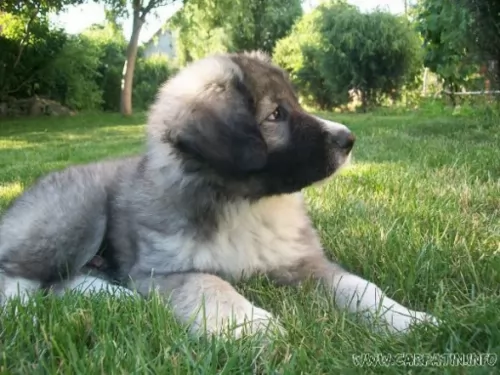 The Carpatin is a large breed dog, standing at 65 to 73cm in height and weighing between 32- and 80kg. The skull of the dog is wide and domed, the ears medium set and floppy. The neck is strong and muscled, the legs strong and straight, the chest deep.
The Carpatin is a large breed dog, standing at 65 to 73cm in height and weighing between 32- and 80kg. The skull of the dog is wide and domed, the ears medium set and floppy. The neck is strong and muscled, the legs strong and straight, the chest deep.
The tail of the Carpatin is long, bushy and high set and his coat is double layered, medium length and pale fawn in color with light grey to black shades being seen as well.
The Carpatin is patient, loving and protective. This is a strong-willed dog who is independent and fairly easy to train as he is intelligent.
It is a good idea to have him trained and socialized as this brings out the best in him. He is a patient and affectionate dog and he’ll get on well with children and tolerate other pets in the home.
They are wary of strangers and become vocal, barking and growling and taking their guard dog role seriously with strangers around.
 The Welsh Terrier is a medium sized breed that is compact and sturdy. They had docked tails in the past, but the practice is now illegal in the U.K. The dog is about as long as it is tall. The head and face are elongated with a beard and whiskers. Females are smaller than males, but both are compact and sturdy.
The Welsh Terrier is a medium sized breed that is compact and sturdy. They had docked tails in the past, but the practice is now illegal in the U.K. The dog is about as long as it is tall. The head and face are elongated with a beard and whiskers. Females are smaller than males, but both are compact and sturdy.
Eyes are almond shaped, dark brown and small. The ears are small and V shaped. They should not be thin. The muzzle is square and strong with a black nose. The lips are tight and they are also black.
They have a double coat with is rugged and wiry on top and the undercoat is insulative and softer. The coat is waterproof and protects from wind and dirt as well. The puppies are all black until about 9 months when they become black and tan. The legs, head and underbelly are tan, with a black saddle.
The Welsh Terrier has wiry hair on the legs, muzzle and quarters. The hair is very dense in the top coat. Their gait and movement is straight, effortless and free.
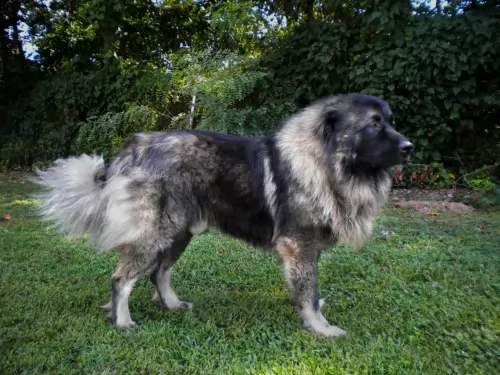 The Carpatin is a big, independent dog who loves his human family. He will guard them too and has all the intelligence and skills to be instinctively alert to danger. Territorial, he makes an excellent watchdog.
The Carpatin is a big, independent dog who loves his human family. He will guard them too and has all the intelligence and skills to be instinctively alert to danger. Territorial, he makes an excellent watchdog.
He isn’t too social around strangers, but with training and socialization he becomes more relaxed and amicable. He responds well to training, especially when he has a firm, strong handler and owner.
Used to being a herding- and working dog, he is happiest when kept busy and isn’t a dog to use essentially for guarding only as he can become aloof and aggressive. Treat him well and have him trained and socialized and you’ll have a wonderful guardian and companion.
 1Children friendliness – The Welsh Terrier is good with kids and will follow them anywhere. They do want to play with the children by tugging on them and could cause a young child to fall. They can learn to play gently with small children.
1Children friendliness – The Welsh Terrier is good with kids and will follow them anywhere. They do want to play with the children by tugging on them and could cause a young child to fall. They can learn to play gently with small children.
3.Adaptability – They do fine in smaller indoor spaces as long as they have a robust exercise routine daily. They will be active indoors.
4.Learning ability -They are very smart, independent thinkers as can been seen by their ability to learn to play gently with small children. They need plenty of socialization early in life
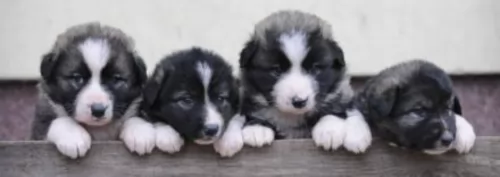 The beautiful Carpatin dog can live to be a healthy 12-14 years if you feed him nutritious foods, provide him with clean water every day, exercise him, give him a dry, warm bed and give him loads of love, attention and care.
The beautiful Carpatin dog can live to be a healthy 12-14 years if you feed him nutritious foods, provide him with clean water every day, exercise him, give him a dry, warm bed and give him loads of love, attention and care.
However every dog can become ill and with the Carpathian Shepherd Dog you certainly want to be aware of ear and eye infections, hip dysplasia and skin disorders.
 The Welsh Terrier is a fairly healthy hunting dog, though they do have some health issues.
The Welsh Terrier is a fairly healthy hunting dog, though they do have some health issues.
• Onychodystrophy – Nails grow weak and are very brittle. They can break easily and cause pain, irritation and even infections.
• Primary lens luxation – causes secondary glaucoma which can cause blindness.
• If hunting, they are exposed to hunting injuries and should be checked over well after a field adventure, whether hunting or in field trials.
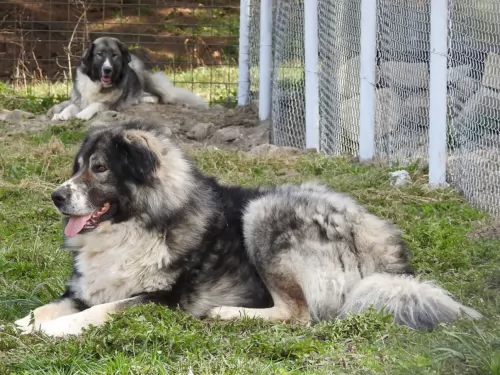 Despite his longish coat, the Carpatin is a low to moderate maintenance dog. To avoid tangles and matting, you’ll need to brush his hair at least twice a week. He won’t however require professional grooming.
Despite his longish coat, the Carpatin is a low to moderate maintenance dog. To avoid tangles and matting, you’ll need to brush his hair at least twice a week. He won’t however require professional grooming.
Dogs with floppy ears will need to have the ears checked to ensure they remain fee of moisture and wax buid-up. The ears can be easily infected when left uncleaned. The nails and teeth should also be checked. Canine toothpaste and brush can help to prevent plaque build-up which can cause gum disease and tooth decay. Not only that, dental disease can lead to other health issues in other parts of the body.
The Carpatin is a medium- to high energy level breed dog and he will therefore need a good amount of exercise to keep him healthy and content. Rope him in to your activities whether you go jogging or cycling. Put him on a leash and take him with – he’ll love it. Dogs who are allowed to be active and part of the family are simply better dogs.
Your Carpatin’s weight, age and activity levels will guide you as to what food is best for him. He needs nutritious food and if you’re unsure how to choose, your veterinarian can advise you on what to look for.
Apart from proteins, your dog needs fats, fiber, carbohydrates, minerals and vitamins. As your dog ages, he or she will go through different life stages, and you want to be sure of ensuring your dog is getting everything he needs to ward of disease and stay happy and healthy.
Make sure your 4-legged canine friend always has a bowl of fresh, cool water available to him.
 1.Feeding the puppy – the breed is prone towards obesity so do not overfeed wither the puppy or the adult. Watch the calorie level and make sure they get high quality, high protein feed meant for the breed or for medium sized dogs. Feed the puppies small amount 3-4 times per day.
1.Feeding the puppy – the breed is prone towards obesity so do not overfeed wither the puppy or the adult. Watch the calorie level and make sure they get high quality, high protein feed meant for the breed or for medium sized dogs. Feed the puppies small amount 3-4 times per day.
2.Feeding the adult - the breed is prone towards obesity so do not overfeed wither the puppy or the adult. Watch the calorie level and make sure they get high quality, high protein feed meant for the breed or for medium sized dogs. Feed the adult at least 2 times per day.
4. Games and Exercises Full of energy and requiring a routine outlet for that energy, the Welsh Terrier is an active dog. Just running around a fenced yard all day will not be enough physical and mental stimulation for them. If bored they can get into trouble. They need a job or a challenge. They love to swim and they love to chase. They do well in agility, field trials and barnhunt.